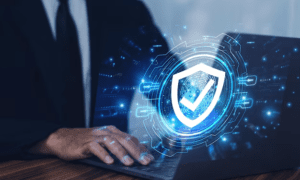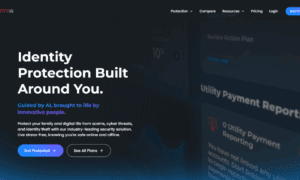Introduction
Online security and protecting your digital footprint are crucial in today’s digital age, where much of our personal and professional lives are conducted online.
A digital footprint, the record of your interactions and activities online, can reveal a lot about your preferences, behavior, and identity. Without proper security measures, this information can be exploited by cybercriminals for fraudulent activities, identity theft, and privacy invasions.
Therefore, understanding and implementing strategies to safeguard your online presence is essential for maintaining privacy, security, and control over your personal information in the digital realm.
Understanding Your Digital Footprint
A digital footprint is the trail of data you leave behind while using the internet. It includes the websites you visit, the social media content you post, and the information you submit to online services. This footprint can be passive, such as the data collected by websites about your browsing habits, or active, like the information you willingly share on social media platforms. Understanding your digital footprint is essential for managing your online privacy and security.
Digital footprints are created through various online activities. For instance:
- posting on social media platforms,
- commenting on blogs, or
- participating in forums
All that leaves a traceable record of personal opinions and interactions. Shopping online or subscribing to services contributes data such as purchase history and preferences. Simply browsing the internet can create a passive digital footprint, where websites collect information on visitor behavior through cookies and analytics tools. Even using search engines contributes to this footprint by logging search queries. Each of these actions adds to a comprehensive record of an individual’s online presence.
Risks Associated with an Unprotected Digital Footprint
- Identity theft.
- Personal data breaches.
- Misuse of information.
Strategies for Protecting Your Digital Footprint
Use of strong, unique passwords
Using strong, unique passwords for each of your online accounts is a fundamental practice for enhancing online security. A strong password typically includes a mix of upper and lower case letters, numbers, and special characters. Unique passwords ensure that if one account is compromised, others remain secure. This approach helps protect against unauthorized access and minimizes the risk of identity theft and data breaches.
Importance of VPNs for encrypted connections
VPNs (Virtual Private Networks) are crucial for maintaining encrypted connections, especially when using public Wi-Fi networks. They work by creating a secure, private tunnel between your device and the internet, encrypting data that passes through. This encryption helps protect your online activities from being intercepted or monitored by third parties, enhancing your privacy and security. Using a VPN is important for safeguarding sensitive information like login credentials and financial transactions from cyber threats.
Regular monitoring of your online accounts and financial statements
Regularly monitoring your online accounts and financial statements is vital for detecting unauthorized transactions and potential identity theft early on. It allows you to quickly spot any discrepancies or unfamiliar activities, which could indicate that your account security has been compromised. Prompt detection enables you to take immediate action, such as changing your passwords or contacting your financial institution, to prevent further unauthorized access and minimize potential losses.
The Role of Proxies in Enhancing Online Privacy
How proxies work to mask your online identity
Proxies work by acting as an intermediary between your device and the internet. When you use a proxy server, your internet traffic is routed through it before reaching its destination. This process masks your IP address with the proxy’s IP address, making it appear as though the traffic originates from the proxy server, not your device. This helps conceal your online identity, enhancing privacy and allowing you to bypass geo-restrictions or internet censorship by appearing to access the internet from a different location.
Different types of proxies and their uses in privacy protection
There are several types of proxies, each serving different privacy and security functions:
- HTTP proxies are ideal for web browsing, offering a basic level of anonymity.
- SOCKS5 proxies provide more comprehensive support, working with almost any kind of traffic but focusing on handling data packets with minimal protocol restriction.
Meanwhile, HTTPS proxies encrypt web traffic for secure browsing. Residential proxies assign you an IP address that looks like a regular home IP, enhancing privacy and reducing the likelihood of being blocked by websites.
Each type caters to specific needs, from simple web surfing to secure, anonymous browsing and accessing geo-restricted content.
Premium SOCKS5 proxies offer the highest level of anonymity, making them ideal for secure and private online activities. To learn more about this protocol and how it enhances your internet privacy, consider exploring a detailed article on What are SOCKS5 Proxies.
Best Practices for Safe Browsing
- Safe browsing habits. Adopting safe browsing habits is essential for online security. This includes regularly updating your software to protect against vulnerabilities, avoiding clicking on suspicious links or downloading from untrusted sources, and using secure, encrypted websites (look for HTTPS in the URL). Additionally, be cautious about the personal information you share online and use privacy-focused browsers or extensions that block trackers.
- Recognizing and avoiding phishing attempts. Recognizing and avoiding phishing attempts involves being cautious with emails and messages requesting personal information, verifying the authenticity of requests by contacting the organization directly (not through provided links), and being wary of urgent or too-good-to-be-true offers. Always check for misspellings or strange email addresses, and use email filters and security software to help detect phishing attempts.
- Importance of secure and encrypted websites (HTTPS). Secure and encrypted websites, indicated by HTTPS in the URL, are crucial for online safety. They ensure that the data exchanged between your browser and the site is encrypted, protecting against eavesdropping and tampering. Using HTTPS is especially important for transactions and when sharing personal information, as it helps prevent cybercriminals from accessing sensitive data.
Regularly Updating Your Security Measures
Regularly updating your security measures, such as antivirus software, firewalls, and all operating systems, is crucial for protecting against the latest cyber threats.
Cybercriminals frequently exploit vulnerabilities in software and systems that have not been updated. Keeping your digital environment up-to-date helps close these security gaps, ensuring your data remains protected against emerging viruses, malware, and other online risks.
Conclusion
In conclusion, securing your online presence and safeguarding your digital footprint is essential in protecting your identity and privacy in the digital age. By understanding how your digital footprint is created and the risks associated with an unprotected digital presence, you can implement strategies like using strong passwords, VPNs for encrypted connections, and regular monitoring of your accounts. Proxies play a key role in masking your online identity, with various types enhancing your privacy in different ways. Adopting safe browsing habits, recognizing phishing attempts, ensuring the use of secure websites, and regularly updating your security measures are all crucial steps in maintaining online security. Together, these practices empower you to navigate the digital world with confidence and security.



































